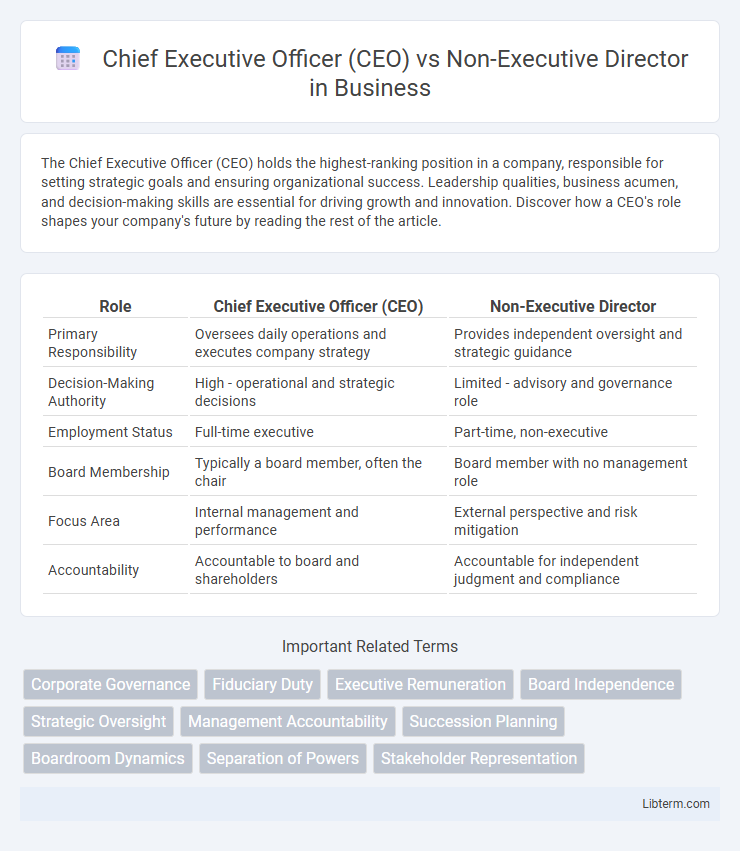The Chief Executive Officer (CEO) holds the highest-ranking position in a company, responsible for setting strategic goals and ensuring organizational success. Leadership qualities, business acumen, and decision-making skills are essential for driving growth and innovation. Discover how a CEO's role shapes your company's future by reading the rest of the article.
Table of Comparison
| Role | Chief Executive Officer (CEO) | Non-Executive Director |
|---|---|---|
| Primary Responsibility | Oversees daily operations and executes company strategy | Provides independent oversight and strategic guidance |
| Decision-Making Authority | High - operational and strategic decisions | Limited - advisory and governance role |
| Employment Status | Full-time executive | Part-time, non-executive |
| Board Membership | Typically a board member, often the chair | Board member with no management role |
| Focus Area | Internal management and performance | External perspective and risk mitigation |
| Accountability | Accountable to board and shareholders | Accountable for independent judgment and compliance |
Introduction to CEO and Non-Executive Director Roles
The Chief Executive Officer (CEO) is responsible for the overall management, strategic direction, and operational execution of a company, acting as the primary decision-maker and leader. Non-Executive Directors provide independent oversight and constructive challenge to the executive team, ensuring accountability and governance without day-to-day operational involvement. Both roles are crucial in corporate governance, balancing leadership with accountability to shareholders and stakeholders.
Defining the CEO: Responsibilities and Scope
The Chief Executive Officer (CEO) holds primary responsibility for the overall management and daily operations of a company, driving strategic direction and ensuring execution of business goals. CEOs oversee key functions such as finance, marketing, operations, and human resources to optimize organizational performance and shareholder value. Their role encompasses decision-making authority, leadership of executive teams, and accountability for delivering sustainable growth and profitability.
Understanding the Role of a Non-Executive Director
A Non-Executive Director (NED) plays a critical role in corporate governance by providing independent oversight and strategic guidance without being involved in day-to-day operations, unlike the Chief Executive Officer (CEO) who manages daily business activities. NEDs ensure accountability by monitoring executive decisions, offering objective judgment, and safeguarding shareholders' interests, often participating in audit, remuneration, and risk committees. This separation of roles enhances transparency and balanced decision-making, fostering sustainable growth and risk management within the organization.
Key Differences Between CEO and Non-Executive Director
Chief Executive Officers (CEOs) are responsible for the day-to-day management and operational decisions of a company, leading internal teams to achieve strategic goals. Non-Executive Directors (NEDs) provide independent oversight, governance, and advice without involvement in daily operations, focusing on safeguarding shareholder interests and ensuring compliance. The CEO executes strategies, while the NED monitors performance, mitigates risks, and contributes to high-level decision-making through board meetings.
Decision-Making Authority: CEO vs Non-Executive Director
Chief Executive Officers (CEOs) possess primary decision-making authority, managing daily operations and executing strategic plans within a company. Non-Executive Directors influence major decisions through board oversight and governance but do not engage in day-to-day management. The CEO's authority is operational and executive, while Non-Executive Directors focus on monitoring, advising, and safeguarding shareholder interests.
Corporate Governance and Board Dynamics
The Chief Executive Officer (CEO) drives a company's operational strategy and execution, holding executive authority within the corporate governance framework, while the Non-Executive Director (NED) provides independent oversight and strategic guidance without involvement in daily management. Effective board dynamics rely on the clear distinction between the CEO's accountability for operational performance and the NED's role in monitoring risks, ensuring ethical standards, and safeguarding shareholder interests. This balance enhances corporate governance by promoting transparency, mitigating conflicts of interest, and fostering constructive challenge and support within the boardroom.
Reporting Lines and Accountability Structures
The Chief Executive Officer (CEO) reports directly to the Board of Directors, ensuring execution of the company's strategic objectives and operational management, while being accountable for daily business performance. Non-Executive Directors (NEDs) do not engage in daily operations but hold the CEO accountable through board oversight, providing independent judgment on corporate governance and strategic decisions. Reporting lines emphasize the CEO's operational responsibility to the board, with NEDs acting as critical monitors of executive activities to safeguard shareholder interests.
Impact on Company Strategy and Performance
The Chief Executive Officer (CEO) directly drives company strategy and operational execution, making real-time decisions that shape business performance and growth trajectories. In contrast, Non-Executive Directors provide independent oversight and strategic guidance, ensuring accountability and governance without involvement in day-to-day management. Their impact on company performance is more strategic and supervisory, influencing long-term objectives and risk management rather than immediate operational outcomes.
Compensation and Remuneration Comparisons
Chief Executive Officers (CEOs) typically receive higher total compensation packages, including base salary, bonuses, stock options, and performance incentives, reflecting their operational responsibilities and accountability for company performance. Non-Executive Directors (NEDs) receive fixed fees and stock-based awards primarily for governance roles, with remuneration significantly lower than CEOs but designed to ensure independence and oversight. CEO compensation averages range significantly by industry and company size, often exceeding $1 million annually in large firms, whereas NED fees usually fall between $50,000 and $300,000 per year.
Choosing the Right Leadership: CEO or Non-Executive Director?
Choosing the right leadership between a Chief Executive Officer (CEO) and a Non-Executive Director depends on the organization's needs for operational management versus strategic oversight. CEOs are responsible for day-to-day executive decisions, driving company growth, and managing internal teams, whereas Non-Executive Directors provide independent governance, risk management, and strategic guidance without direct involvement in daily operations. Prioritizing a CEO suits businesses requiring strong leadership in execution and growth, while Non-Executive Directors benefit organizations seeking enhanced accountability and external perspective at the board level.
Chief Executive Officer (CEO) Infographic

 libterm.com
libterm.com